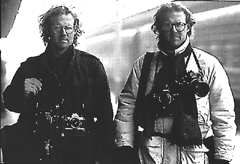The University Record, September 27, 1999 Editor’s Note: This article is one in a series of profiles of U-M alumni who have made significant and lasting contributions through their research, scholarship and creative activity. Expanded versions of these articles are available on the Web at
By Lee Katterman
Office of the Vice President for Research

Thanks in small part to a high school football injury and the educational philosophy of the Residential College (RC), Peter and David Turnley have become two of the leading photojournalists of our time. The twin brothers from Indiana, and graduates of the RC, have recorded and photographically interpreted every major world event of the last two decades.
The brothers trace their interest in photography to a camera and book of photographs by Henri Cartier-Bresson given to 16-year-old Peter by his parents when he was recovering from a knee injury suffered during his junior year. Peter says this was a defining moment since it convinced him that he wanted to become a professional photographer. It wasn’t long before David also was caught up in his brother’s new passion, and both began serious photography projects while still in high school.
David and Peter entered the U-M in fall 1973, and enrolled in the Residential College. Each of them spent time both on and off campus working on photography projects. At different times, each spent time studying in Paris, too.
“We were really lucky,” David says. “We were part of an experimental college within the University that gave us credit for just about everything we did during those years.” They both graduated from the University with degrees in French literature, David in 1977 and Peter in 1978.
Tom Weisskopf, professor of economics and director of the Residential College, has been in touch with both Turnley brothers for some time. Weisskopf says Michigan “opened their eyes to the world” in special ways. The opportunity to receive encouragement and course credit for photography, and the focus on languages and study abroad found in the Residential College made significant contributions to the career paths of these two alumni.
After leaving Ann Arbor, Peter spent the next year working on a road construction crew in Indiana, hoping to earn enough money to return to Paris where he intended to take up freelance photography. David stayed in Michigan for the next several years working as a photographer for a series of small-town newspapers, eventually landing a job with the Detroit Free Press, a relationship he maintains to this day.
David’s breakthrough undoubtedly came in 1985 when the Free Press sent him to South Africa for a month-long photography assignment. That visit lasted nearly three years, until he was banished from the country by the apartheid government. Since then, he has witnessed through his camera lens such historic events as the fall of communism in eastern Europe, the Tiananmen Square uprising, the return of Nelson Mandela and fall of apartheid, the Desert Storm military operation in the Persian Gulf, and the separatist rebellion in Chechnya in southern Russia.
After his road construction job, Peter moved to Paris to pursue his photography career. He also attended and graduated from the Institute d’Etudes Politiques, one of the few foreign students ever to do so.
Peter has become a much-sought-after photographer whose pictures appear in publications such as Newsweek, Life, Paris Match, National Geographic and the London Sunday Times. When Newsweek published its issue devoted to the 40th anniversary of D-Day, Peter Turnley did the cover story. And, like his brother, he also has been on the scene of many world conflicts, from the Gulf War to Bosnia, the Arab-Israeli conflict, and the wars in Somalia and Rwanda.
Both Turnley brothers have received honors from all of the major international photojournalism organizations, such as the Overseas Press Club. In addition, David has been runner-up four times for the Pulitzer Prize, and, in 1990, was awarded the Pulitzer for his photographs of the political uprisings in China and Eastern Europe.
“We’ve both had the great fortune as brothers to be in each other’s company and sharing a camaraderie in the middle of some of the most intense moments of one’s life,” says Peter, still based in Paris.
“It’s an exhilarating profession for me,” says David, who now lives in New York and is working on TV documentaries—including a one-hour special on the Dalai Lama aired on CNN last month—as well as photojournalism. “I have the possibility of being creative and somewhere I have a voice.”

